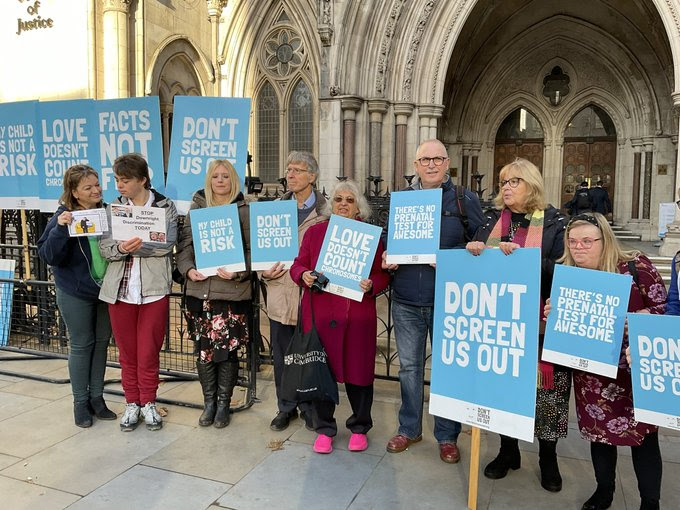Disability campaigners to take abortion law case to Supreme Court

Campaigners for the equal treatment of people with Down's syndrome are to take their challenge against a discriminatory abortion law to the Supreme Court after losing in the Court of Appeal today.
The campaign to change the legal time limit for abortion in cases of disability is being led by Heidi Crowter, a 27-year-old woman with Down's syndrome, and Máire Lea-Wilson, who was pressured to abort her son when a 34-week scan revealed he had the condition.
Abortion is legal in England, Wales and Scotland up to 24 weeks, but in cases of disability, including Down's syndrome, cleft lip and club foot, babies can be aborted up to birth.
The UN Committee on the Rights of Persons with Disabilities recommended that the UK change its abortion law so that babies with disabilities are not singled out. This recommendation has been ignored by the government.
Crowter and Lea-Wilson were seeking to overturn a previous ruling that the time limit for abortion on the grounds of disability is not unlawful.
Responding to the Court of Appeal's ruling, Ms Crowter said: "We face discrimination every day in schools, in the workplace and thanks to this verdict the judges have upheld discrimination in the womb to which is downright discrimination.
"When Wilberforce wanted to abolish the slave trade he didn't give up when things didn't go his way. I won't give up either because the law should be changed to get rid of a negative focus on Down's syndrome - even the words used in it are offensive.
"This law was made in 1967 when we were not even allowed to go to school because of our extra chromosome, so I think it's time that the judges move with the times and actually meet people with Down's syndrome and see the people behind the chromosome."
Ms Lea-Wilson, 33, said that the ruling "condones discrimination by cementing the belief in society that their lives are not as valuable as the lives of people without disabilities".
"I am surprised and disappointed to see that the ruling gave very little consideration to the feelings of people with Down syndrome and how section 1(1)(d) of the Abortion Act has a very real and painful impact on their self worth and mental health," she said.
"The judgment also gives very little consideration to the fact that many women, like myself, are pressured to abort much wanted pregnancies at such a late stage in the context of fear and misinformation which is given to them."
She said she would continue the fight to change the law and dispel the "negative, outdated and prejudicial attitudes that are prevalent in society and the medical profession".
The campaigners were represented by Paul Conrathe, of Sinclairslaw, who called the judgment "disappointing and perplexing".
"Rather than affirming the equal value of those with disabilities, it further adds to the stigmatisation they suffer," he said.
"By failing to give legal recognition to the suffering and stigmatisation that people with disabilities feel about a law which singles them out for termination in the womb, the Court has further diminished a fragile voice for equal value.
"Yet again their perceptions are disregarded. My clients are resolute in their fight for the legal recognition of the equal value of people with disabilities and will appeal to the Supreme Court to see this anachronistic and outdated legislation changed."
Lynn Murray, spokesperson for Don't Screen Us Out and mother of Rachel who has Down's syndrome, said: "Our laws should be supportive of those with Down's syndrome and their parents, sadly the abortion law as it stands does quite the opposite.
"Heidi and Maire took up this case simply to ask for a level playing field, to stop the discrimination being perpetuated by section 1.1.d of the abortion law, so it's very unfortunate that the judgement handed down today doesn't contribute to any levelling-up."
Christian charity CARE said that the Court of Appeal's decision was "heartbreaking".
A spokeswoman for CARE said, "It is completely wrong that disability is a ground for abortion up to birth. Would we accept a law allowing babies to be aborted to term based on their sex, or their race?
"The current approach sends a message that the lives of people with disabilities are worth less than others.
"It is welcome to hear that Heidi wants to continue her fight all the way to the Supreme Court. We trust that, in time, whether it is through this court or the parliamentary process, our country will move away from such regressive policies."











